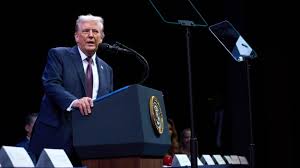President Donald Trump has announced new initiatives to expand student and professional exchange programs with universities across Europe. The programs are designed to increase cultural understanding and provide more learning opportunities for participants.
American students will have the chance to study at European universities through short-term or full academic programs, while European students can join U.S.-based programs to experience American education, culture, and professional environments. Trump emphasized that these exchanges will strengthen ties between the United States and Europe by fostering knowledge sharing and long-term relationships.
The programs will cover multiple fields, including science, technology, engineering, mathematics, business, and the arts. Universities in Germany, France, Italy, and Spain are expected to participate in the initial phase. Participants will also receive financial support through scholarships and grants to cover tuition, travel, and living costs, ensuring opportunities are accessible to students from diverse backgrounds.
Educators note that international exchanges help students develop critical thinking, problem-solving skills, and global awareness. They provide a broader perspective on the world and prepare participants for future careers in an increasingly interconnected environment.
The initiative also includes professional exchange programs for young professionals and academics. These participants will work and conduct research at partner institutions, creating networks for knowledge sharing and collaboration. Hands-on international experience will help participants develop cross-cultural communication skills and expand professional networks, enhancing career prospects.
Trump stressed that the programs are not only about education but also about cultural exchange. Participants will engage in local communities, attend workshops, and take part in cultural activities. Officials say that cultural immersion is as important as academic study, giving students firsthand experience of different traditions, languages, and social practices. This exposure helps them become more adaptable and empathetic global citizens.
The programs are intended to promote collaboration between U.S. and European universities. Faculty members will also have opportunities to join joint research projects and academic exchanges. Experts say that such collaboration improves the quality of education and research while fostering innovation across multiple fields.
The initiative is expected to grow over the next several years, with more universities and participants joining. Officials hope it will inspire similar programs worldwide, encouraging other countries to invest in student and professional exchanges. By fostering education, professional development, and cultural understanding, the programs aim to prepare a new generation of globally aware leaders who can strengthen international partnerships and build more informed communities.

